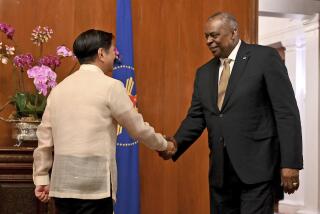U.S., Japan Reach Pact to Broaden Air Access
- Share via
In a boost for air travel and U.S.-Japan relations, negotiators from the two countries signed a tentative accord Friday that will significantly broaden air access to Japan and other destinations, capping fractious international trade talks that went on for years.
The pact will allow several U.S. carriers to expand their operations in Japan by adding flights and creating partnerships with foreign airlines to provide more routes from Japan to other countries.
In exchange, Japan’s second-biggest airline, All Nippon Airways, will gain unlimited access to U.S. cities, which the Asian nation’s flagship carrier, Japan Air Lines, already enjoys.
For business and leisure travelers, the payoff will come in the form of greater choice and routing flexibility rather than a steep drop in fares, which will remain partially regulated by Tokyo. Moreover, industry observers do not expect demand to shoot up in the near future because of the economic crisis in Asia.
But the U.S. government, citing “the value of additional service” in a more competitive market, estimates that passengers will save $1.2 billion over the lifetime of the four-year agreement. The government also said it will generate more than $4 billion in increased revenue for U.S.-based airlines over the four years, partly because U.S. carriers will gain market share.
The agreement, signed in Washington, revises a more restrictive 1952 aviation treaty that had become one of the most contentious trade issues bedeviling U.S.-Japanese economic ties.
For years, each side has attempted to further pry open the other’s air market during numerous rounds of rancorous talks that often descended into brinkmanship as politicians threatened sanctions and retaliation.
Although the agreement falls short of the completely deregulated “open skies” market that the U.S. had sought, most officials and airline executives praised the accord, whose details will be finalized in coming months.
“This is a dramatic step forward,” U.S. Transportation Secretary Rodney Slater declared. “The Asia-Pacific region accounts for over one-third of the world’s international passenger traffic, and this agreement will continue to provide our carriers, passengers and businesses critical access to that region.”
The chief beneficiaries of Friday’s agreement are American, Continental and Delta airlines, whose transpacific business had been severely constrained by the terms of the 1952 treaty. Under the new accord, the three can collectively offer up to 90 more round-trip flights per week to Japan--up from 46 now--and can form partnerships with foreign airlines for seamless service to other destinations.
Another potential winner is Trans World Airlines, which has already applied to be one of the two new U.S. carriers that will be allowed entry into the lucrative U.S.-Japan aviation market over the next two years.
United and Northwest airlines, which already enjoyed less fettered Japanese access, will now face greater competition. But the accord also increases their access from any U.S. hub to any point in Japan, and it removes limits on the number of continuing flights they can operate from Japan to other parts of Asia.
United immediately announced plans to more than double its flights between Chicago and Tokyo, from six each week to 14, starting April 5.
“The agreement heralds a new and promising era in aviation relations,” United Airlines Chairman Gerald Greenwald said. “The new accord will enable air service between the U.S. and Japan to expand in accordance with the needs of consumers and their communities for the first time in decades.”
Air cargo carriers were included in Friday’s accord, which gave Federal Express the same unrestricted access as United and Northwest airlines. United Parcel Service and Long Beach-based Polar Air Cargo will be able to expand their business as well.
But the two airlines with the most to lose--Northwest and Japan Air Lines--expressed disappointment with the deal.
*
Richard B. Hirst, a senior vice president of Northwest--the most aggressive lobbyist among the airlines for totally open skies--criticized the deal for not going far enough.
“Our view has consistently been that a full open skies agreement was attainable . . . but that it required patience,” said Hirst, whose company had taken out full-page ads in major newspapers attacking Japan’s negotiating position. “A lot of people think it’s time for Japan to deregulate in many areas.”
But “having said that,” he added, “the agreement . . . is a substantial improvement. It secures our position as a viable competitor in the Pacific.”
Hirst said Northwest, which boards 1.5 million passengers in Japan each year, had been in danger of losing some slots in Tokyo’s Narita Airport but is now assured of retaining them.
Meanwhile, JAL President Akira Kondo called the deal “a big disappointment. The benefits to U.S. airlines far exceed any benefits for Japanese airlines. The purpose of these negotiations was to narrow the imbalance between Japan and the U.S. which has favored the U.S. since 1952. Instead, the gap has been widened.”
He especially objected to the expanded rights of U.S. carriers to pick up traffic in Japan to fly to other Asian destinations, arguing that it “will have an adverse impact on Japanese and Asian airlines at a time when regional traffic demand is either stagnant or falling.”
Japan had resisted total deregulation on the grounds that the 1952 treaty, signed when Japan had no national airline, had put the island nation at a disadvantage for decades.
Shifting to open skies would have worsened Japan’s handicap, said Barbara Beyer, president of Avmark, an aviation consulting firm in Arlington, Va.
“Because of their restricted position previously, they just don’t have the resources to be immediately competitive, and they’d just get creamed by U.S. competitors” in a fully free market, Beyer said.
Times staff writer David Holley in Tokyo contributed to this story.
More to Read
Sign up for Essential California
The most important California stories and recommendations in your inbox every morning.
You may occasionally receive promotional content from the Los Angeles Times.














